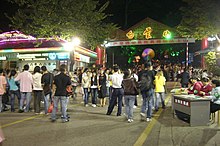Baiyun Mountain
| Baiyun Mountain | |
|---|---|

Baiyun with Zhujiang New Town in the distance
|
|
| Highest point | |
| Elevation | 382 m (1,253 ft) |
| Geography | |
| Location | Guangzhou, Guangdong, China |
| Climbing | |
| Easiest route | Cable Car |
| Baiyun Mountain | |||||||||||||

Entrance to the Baiyun Scenic Area
|
|||||||||||||
| Simplified Chinese | |||||||||||||
|---|---|---|---|---|---|---|---|---|---|---|---|---|---|
| Traditional Chinese | |||||||||||||
| Cantonese Yale | Baahkwàhn Sāan | ||||||||||||
| Cantonese Jyutping | Baak6-wan4 Saan1 | ||||||||||||
| Hanyu Pinyin | Báiyúnshān | ||||||||||||
| Postal | Pakwan Mountain | ||||||||||||
| Literal meaning | White Cloud Mountain | ||||||||||||
|
|||||||||||||
| Alternative Chinese name | |||||||||||||
| Simplified Chinese | |||||||||||||
| Traditional Chinese | |||||||||||||
| Cantonese Yale | Wàhnsāan | ||||||||||||
| Cantonese Jyutping | Wan4-saan1 | ||||||||||||
| Hanyu Pinyin | Yúnshān | ||||||||||||
| Literal meaning | Cloudy Mountain | ||||||||||||
|
|||||||||||||
| Transcriptions | |
|---|---|
| Standard Mandarin | |
| Hanyu Pinyin | Báiyúnshān |
| Yue: Cantonese | |
| Yale Romanization | Baahkwàhn Sāan |
| Jyutping | Baak6-wan4 Saan1 |
| Transcriptions | |
|---|---|
| Standard Mandarin | |
| Hanyu Pinyin | Yúnshān |
| Yue: Cantonese | |
| Yale Romanization | Wàhnsāan |
| Jyutping | Wan4-saan1 |
Baiyun Mountain, formerly romanized as Pakwan, is a mountain range in Guangzhou, the capital of China's Guangdong Province. It is organized as the Baiyun Scenic Area and is the site of Luhu Park, Yuntai Garden, Mingchun Valley, Moxing Peak, Mingzhu Tower, Yunxi Ecological Park, and the Baiyun Sculpture Park.
Báiyún is Mandarin Chinese for "White Clouds", derived from views of the mountain's peaks shrouded in mist during late Spring or after a rain. Its former English name, Pakwan, is a form of the Cantonese pronunciation of the same name. In English, it is also known as White Cloud Mountain, Mount Baiyun, Baiyun Shan, or—since the "mountain" is, properly speaking, a "mountain range"—the "Baiyun Mountains".
Baiyun is informally known as the "City's Lung" (), from its greenery. It is also acclaimed as the "First Beauty in Guangzhou” () or the “Most Famous Mountain South of Ling” (). Moxing Peak, its highest point, is similarly sometimes called the “First Peak under the Southern Sky” ().
Baiyun is a mountain range located 15 kilometers (9 mi) north of central Guangzhou, made up of about 30 peaks, with an area of 28 km2 (11 sq mi). It is forms the southern end of the Dayu Mountains (), themselves part of the Nanling Mountains (). Baiyun's highest point is Moxing Peak (, lit. “Star-scraping Peak”) at 382 meters (1,253 ft) above sea level. Vegetation covers over 95% of the area of Baiyun Mountain, enabling it to absorb 2800 tons of carbon dioxide and release 2100 tons of oxygen each day.
...
Wikipedia
